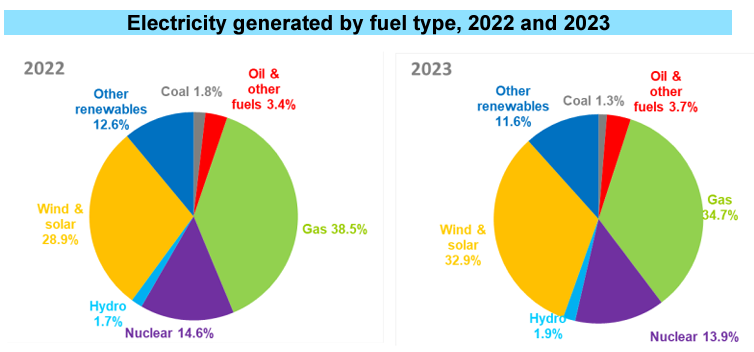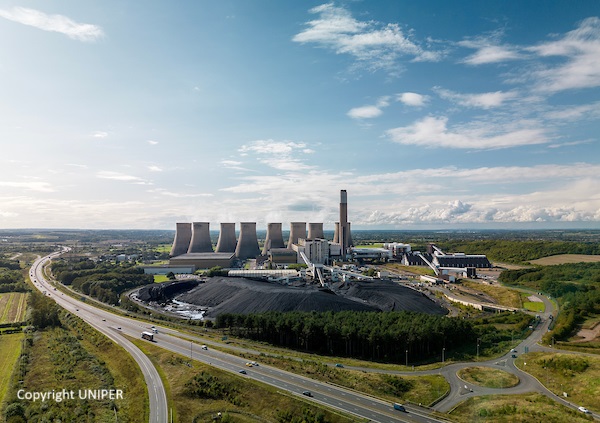On September 30, 2024, the last coal-fired power plant in the United Kingdom (UK), the birthplace of coal-fired power generation, finished operation, ending 142 years of coal-fired history since the world’s first coal-fired power plant was built in London by inventor Thomas Edison in 1882.
Countries across the world are phasing out coal-fired power generation, which emits particularly high levels of carbon dioxide (CO2). In particular, the Group of Seven (G7) industrialized nations, at their meeting of Climate, Energy, and Environment Ministers in Turin, Italy, in May 2024, agreed to phase out unabated coal-fired power generation by 2035. This phase-out of coal-fired power generation in the UK is the first in the G7. The UK has become the first G7 country to give up coal.
The UK’s final coal-fired power plant
The last coal-fired power plant in the UK was the Ratcliffe-on-Soar power station near Nottingham in central England. Operated by German energy giant Uniper, construction of the plant began in 1963, and it had supplied electricity for 57 years since it started operation in 1967. It had a total generating capacity of 2 GW with four units of 500 MW each, and featured eight 114-meter-high, 87-meter diameter cooling towers at the bottom and 55-meter diameter at the top. Uniper expects the decommissioning to take around two years before the site can be handed over to a demolition contractor and the approximately 270 hectares site will be demolished.
By the time the UK announced in 2015 its plan to limit the use of coal-fired power by 2023 and close all coal-fired power plants by 2025, about 30% of its electricity was being provided by coal. Since then, nine years have passed. According to the UK’s Department for Energy Security & Net Zero (DESNZ), in the second quarter of 2024, just before the closure of its coal-fired power plants, coal demand by power producers in the UK was 135,000 tons, 6.6% higher than the same period the previous year, but coal-fired power accounted for less than 1% of overall electricity generation.
Percentage of electric power supply
The UK has been increasing its share of renewable energy, including the construction of a large offshore wind farm. In 2023, coal-fired power accounted for only 1.3% of electricity generation, compared with 32.9% for wind and solar, 1.9% for hydro, and 11.6% for other renewable energy sources. The total of these renewable energy sources was 46.4%, higher than the 39.7% of fossil fuels (gas: 34.7%, oil and other: 3.7%, coal: 1.3%). This expansion of renewable energy has facilitated the phasing out of coal-fired power plants.

Coal phase-out is proceeding in other countries
The UK is the first G7 country to phase out coal-fired power, but other countries are also steadily moving forward.

Italy has committed to phasing out coal-fired power generation by the end of 2025, with the exception of Sardinia, which is planned to end between 2026 and 2028.
France extended the retirement date of its last two coal plants from 2024 to 2027. According to data from the International Energy Agency (IEA), coal-fired power accounted for only 2.6% of France’s total electricity generation in 2023, and the country is promoting its Strategy for Energy and Climate, including phasing out use of coal in the electricity sector by 2027.
Canada still has four provinces (Alberta, Saskatchewan, New Brunswick and Nova Scotia) still burning coal to generate electricity. However, all four provinces have committed to phase out coal or capture all CO2 emission from coal plants by 2030.
Germany has stated that it will check whether it is possible to accelerate the scheduled phase-out of coal-fired power plants by three years each in 2026, 2029, and 2032. If this is possible, Germany will completely phase out coal in the electric sector by 2035. It was also reported that seven coal-fired power plants, with an installed capacity equivalent to 3.1 GW, would be phased out by the end of March this year. Germany is steadily progressing with its phase-out of coal-fired power generation.
Japan should also play its role as a G7 member
The closure of coal-fired power generation has been a significant factor in the reduction of the UK’s greenhouse gas emissions. In the process of setting a net-zero goal by 2050, the country has also focused on expanding renewable energy in an effort to decarbonize the power sector.
Since the G7’s share of global electricity generation is small, some say that emission reductions will be insignificant unless progress is made in moving away from coal-fired power in China and India, which are highly dependent on coal-fired power and emit large amounts of greenhouse gas. Nevertheless, as emissions per unit of electricity generated from coal-fired power plants are significantly higher compared to other fuels, it is essential to first reduce coal-fired power generation. To promote decarbonization in electricity, the G7 countries must take the lead and hasten the shift to renewable energy, and the UK’s coal phase-out is one rapid movement indicating a global shift towards a coal-free future.
Japan’s dependence on coal-fired power is high among developed countries, as coal currently accounts for about 30% of the country’s electricity and no coal exit target has been set. When will Japan, which continues to cling to coal, finally begin to significantly reduce its coal-fired power generation?
★Message from British Ambassador (SNS)

